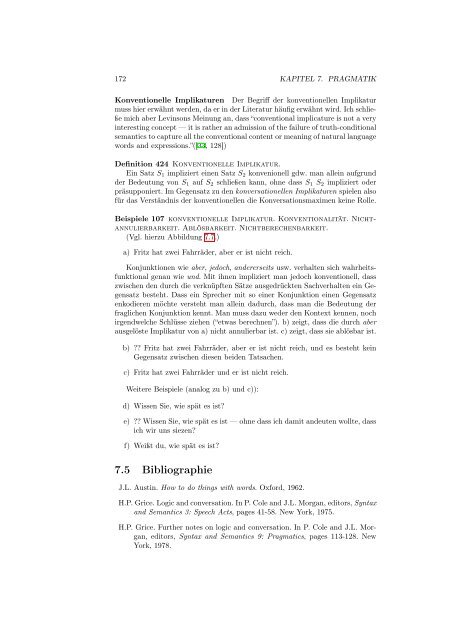Einführung in die Linguistik
You also want an ePaper? Increase the reach of your titles
YUMPU automatically turns print PDFs into web optimized ePapers that Google loves.
172 KAPITEL 7. PRAGMATIK<br />
Konventionelle Implikaturen Der Begriff der konventionellen Implikatur<br />
muss hier erwähnt werden, da er <strong>in</strong> der Literatur häufig erwähnt wird. Ich schließe<br />
mich aber Lev<strong>in</strong>sons Me<strong>in</strong>ung an, dass “conventional implicature is not a very<br />
<strong>in</strong>terest<strong>in</strong>g concept — it is rather an admission of the failure of truth-conditional<br />
semantics to capture all the conventional content or mean<strong>in</strong>g of natural language<br />
words and expressions.”([33, 128])<br />
Def<strong>in</strong>ition 424 Konventionelle Implikatur.<br />
E<strong>in</strong> Satz S 1 impliziert e<strong>in</strong>en Satz S 2 konvenionell gdw. man alle<strong>in</strong> aufgrund<br />
der Bedeutung von S 1 auf S 2 schließen kann, ohne dass S 1 S 2 impliziert oder<br />
präsupponiert. Im Gegensatz zu den konversationellen Implikaturen spielen also<br />
für das Verständnis der konventionellen <strong>die</strong> Konversationsmaximen ke<strong>in</strong>e Rolle.<br />
Beispiele 107 konventionelle Implikatur. Konventionalität. Nichtannulierbarkeit.<br />
Ablösbarkeit. Nichtberechenbarkeit.<br />
(Vgl. hierzu Abbildung 7.7.)<br />
a) Fritz hat zwei Fahrräder, aber er ist nicht reich.<br />
Konjunktionen wie aber, jedoch, andererseits usw. verhalten sich wahrheitsfunktional<br />
genau wie und. Mit ihnen impliziert man jedoch konventionell, dass<br />
zwischen den durch <strong>die</strong> verknüpften Sätze ausgedrückten Sachverhalten e<strong>in</strong> Gegensatz<br />
besteht. Dass e<strong>in</strong> Sprecher mit so e<strong>in</strong>er Konjunktion e<strong>in</strong>en Gegensatz<br />
enko<strong>die</strong>ren möchte versteht man alle<strong>in</strong> dadurch, dass man <strong>die</strong> Bedeutung der<br />
fraglichen Konjunktion kennt. Man muss dazu weder den Kontext kennen, noch<br />
irgendwelche Schlüsse ziehen (“etwas berechnen”). b) zeigt, dass <strong>die</strong> durch aber<br />
ausgelöste Implikatur von a) nicht annulierbar ist. c) zeigt, dass sie ablösbar ist.<br />
b) ?? Fritz hat zwei Fahrräder, aber er ist nicht reich, und es besteht ke<strong>in</strong><br />
Gegensatz zwischen <strong>die</strong>sen beiden Tatsachen.<br />
c) Fritz hat zwei Fahrräder und er ist nicht reich.<br />
Weitere Beispiele (analog zu b) und c)):<br />
d) Wissen Sie, wie spät es ist?<br />
e) ?? Wissen Sie, wie spät es ist — ohne dass ich damit andeuten wollte, dass<br />
ich wir uns siezen?<br />
f) Weißt du, wie spät es ist?<br />
7.5 Bibliographie<br />
J.L. Aust<strong>in</strong>. How to do th<strong>in</strong>gs with words. Oxford, 1962.<br />
H.P. Grice. Logic and conversation. In P. Cole and J.L. Morgan, editors, Syntax<br />
and Semantics 3: Speech Acts, pages 41-58. New York, 1975.<br />
H.P. Grice. Further notes on logic and conversation. In P. Cole and J.L. Morgan,<br />
editors, Syntax and Semantics 9: Pragmatics, pages 113-128. New<br />
York, 1978.



